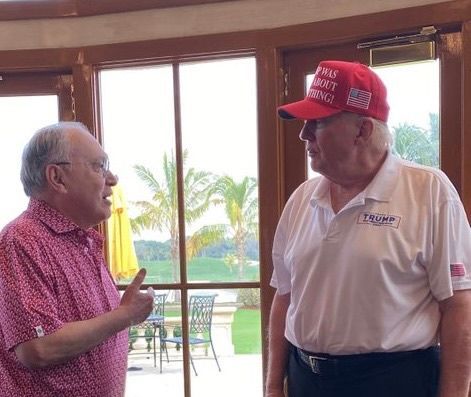PH envoy allays fears of US aid freeze, says it's just 'temporary'

(From left) Philippine Ambassador to Washington Jose Manuel Romualdez and President Donald Trump during a meeting at the Trump International Golf Club in Florida. (Photo courtesy of Amb. Romualdez)
Amid fears that the United States’ aid to the Philippines will stop because of an executive order signed by President Trump, Philippine Ambassador to Washington Jose Manuel “Babe” Romualdez said yesterday that this will be temporary and will not affect military agreements.
In an interview on Super Radyo dzBB, the envoy assured that there is no need to fear the possible repercussions of Trump’s order to temporarily suspend all US foreign assistance programs and review if these are aligned with his foreign policies.
“Wala naman [dapat ipangamba] dahil sa tingin namin, itong suspension na ito talaga ay just a tough time for them talaga para i-review ‘yung kanilang foreign aid sa lahat ng mga ibang bayan (There is no need [to fear] because we think this suspension is really just a tough time to review their foreign aid to all countries),” he said.
The ambassador added that the military aid the Philippines has been receiving from the US “is not even considered aid” because it is part of Washington’s military operations, such as the Enhanced Defense Cooperation Agreement (EDCA).
The EDCA is a 2014 agreement between the two countries to bolster their alliance and allow US troops to construct and operate facilities in the Philippines.
“That is mutually beneficial for both our countries dahil it is important for them na nandiyan sila, na may presence sila diyan sa the Indo-Pacific Region at tayo naman, we want them to be present dahil iyon na nga ang ating problema diyan sa West Philippine Sea (because it is important for them to be there, to have presence in the Indo-Pacific Region and as for us, we want them to be present because of our problem in the West Philippine Sea),” Romualdez explained, referring to Manila’s territorial and maritime disputes with China.
The biggest aid the Philippines is getting from the US is anchored on their military commitments—the Armed Forces of the Philippines (AFP) modernization program and the operations of the EDCA sites.
The envoy, however, admitted that other types of financial and humanitarian assistance, such as programs on Acquired Immunodeficiency Syndrome-Human Immunodeficiency Virus (AIDS-HIV), climate change, and other research-based assistance from the United States Agency for International Development (USAID) will be affected.
“Iyan titigil, i-reassess kung makatulong sa kanilang foreign policy (That will be stopped, will be reassessed if it will help their foreign policy),” Romualdez said.
But again, the ambassador expressed confidence that the suspension of aid will be “temporary.”
The US has been one of the Philippines’ biggest sources of aid in various sectors, including disaster relief, economic development, health, and education, among others.
In the Indo-Pacific region, Manila is the largest recipient of US military assistance in the Indo-Pacific region, receiving over $1.14 billion in military equipment and training from 2015 to 2022.
But Trump has taken a hardline stance against US foreign assistance, emphasizing the need to ensure that any aid given by the US is aligned with American interests and values.
Not asking for aid
The Philippines need not act like a self-pitying pauper in light of the US government's decision to temporarily freeze the delivery of foreign aid.
In fact, economist-solon Albay 2nd district Rep. Joey Salceda believes that the Philippines would do just fine despite this announcement from the Trump administration.
"The US has not been a major source of aid for the Philippines for a while now, far behind Japan, the World Bank, and ADB (Asian Development Bank), and AIIB (Asian Infrastructure Investment Bank)," said Salceda, chairman of the House Committee on Ways and Means.
"The US has been in the low single digits as far as aid goes, even behind Korea. On that matter, we'll be fine. Their aid is their decision to make. Nothing needs to be done on our end," he said.
According to Salceda, the Philippines isn't asking for aid. Or at least, that's not what it needs the most from Washington.
"We are not asking for aid. We are asking for fair access to US markets--which remain our biggest export destination," Salceda said.
"If our exports are imposed punitive rates, we should understand that as not the act of a friend, and orient our trade and foreign policy accordingly," he said.
Salceda noted how Philippine-US relations--particularly under the second administration of Donald Trump--began on the right foot.
"Among all Asian countries, US Secretary of State Marco Rubio called the Philippine government first. So, US-Philippine ties remain strong and strategic. The US would be unwise not to see our supreme strategic importance in their Asia policy and interests," he said. (With a report from Ellson Quismorio)